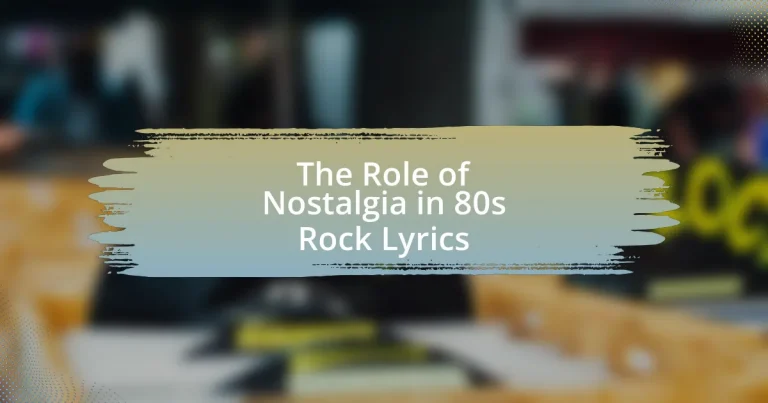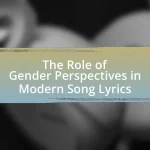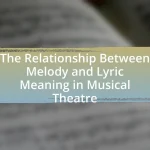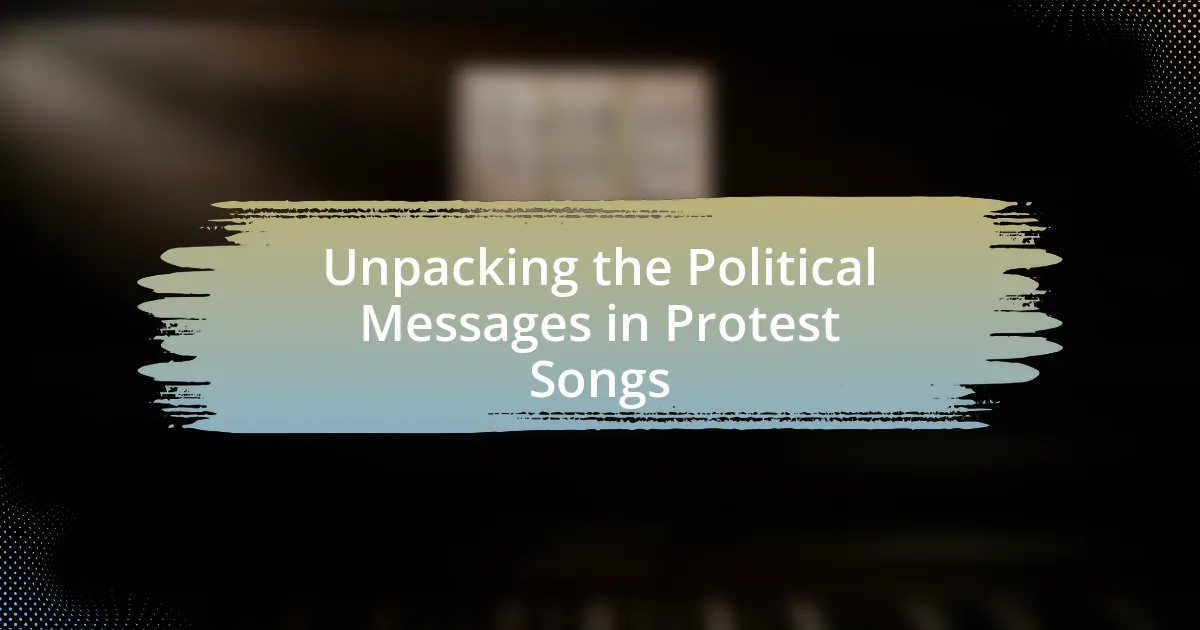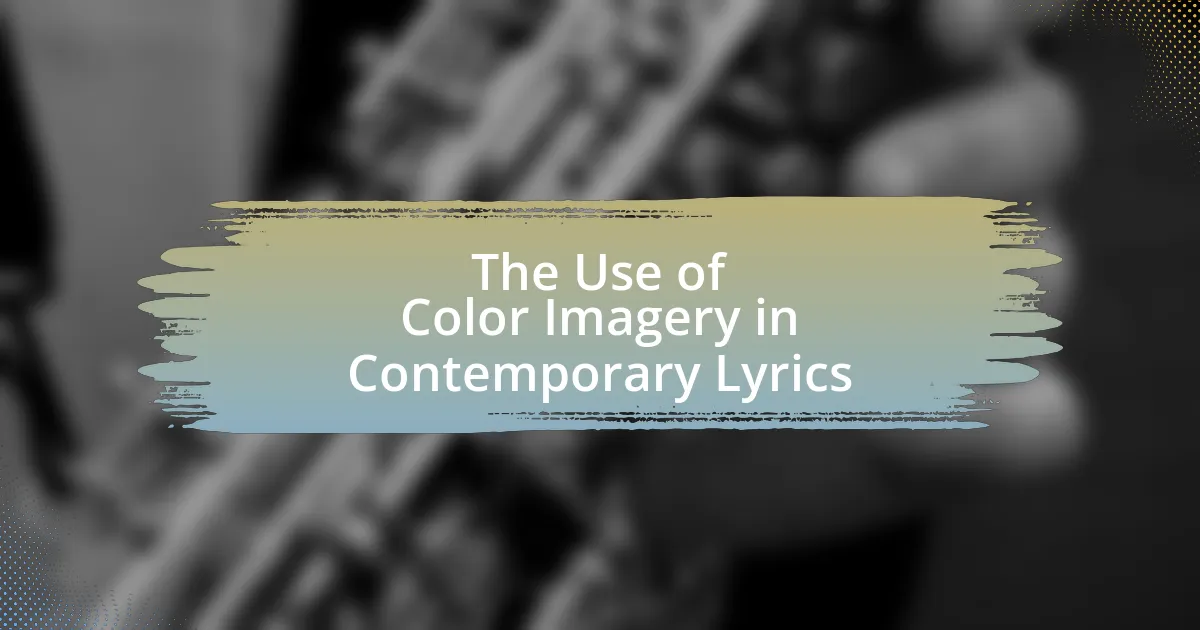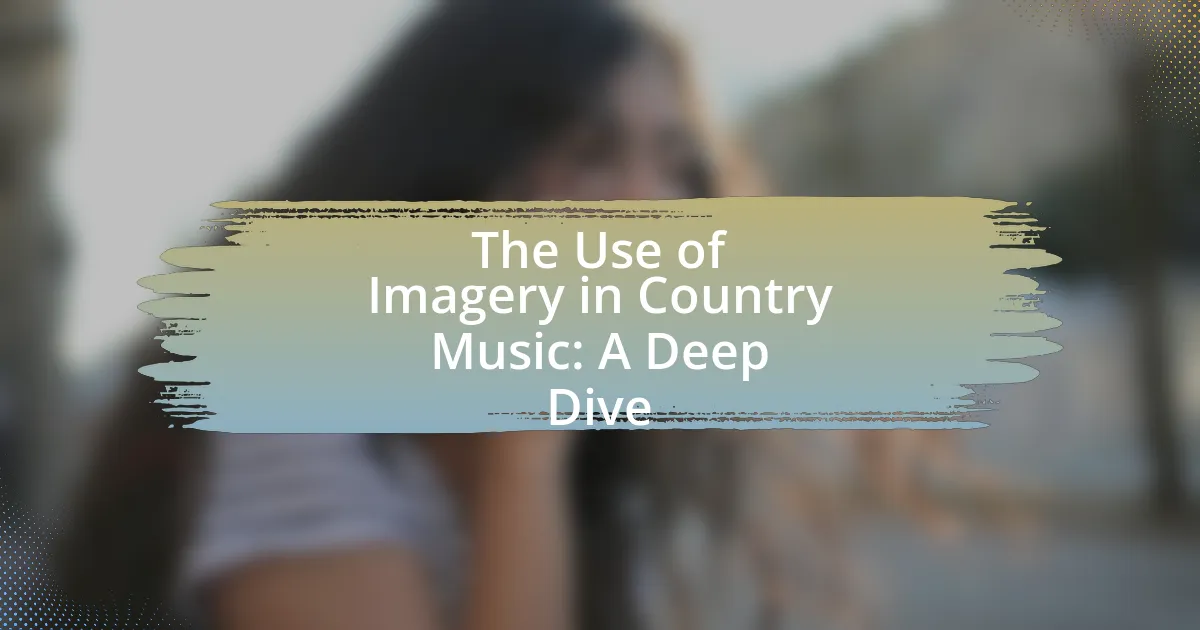The article examines the significant role of nostalgia in 80s rock lyrics, highlighting how it evokes memories of past experiences, emotions, and cultural moments. It discusses common themes such as longing for simpler times, love, and lost youth, as exemplified by iconic songs like “Summer of ’69” by Bryan Adams. The piece also explores the emotional responses triggered by nostalgic references, the influence of personal memories on interpretation, and the cultural factors that contributed to the rise of nostalgia in this musical era. Additionally, it compares nostalgia in 80s rock to other genres and analyzes its impact on contemporary music, providing insights into audience connection and songwriting techniques.
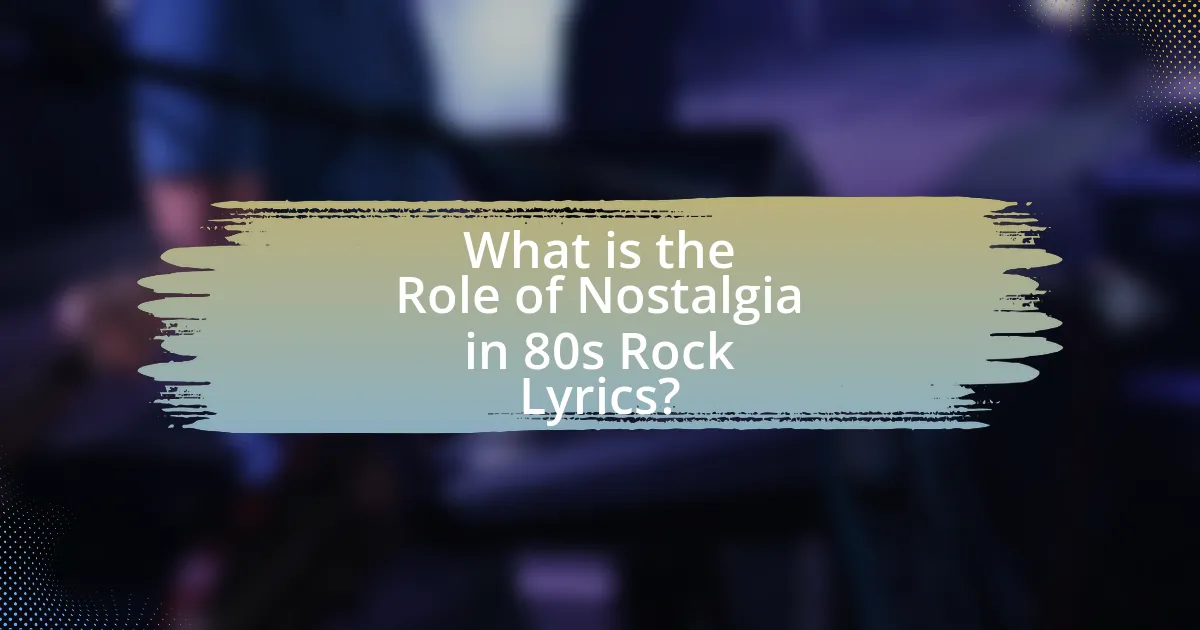
What is the Role of Nostalgia in 80s Rock Lyrics?
Nostalgia plays a significant role in 80s rock lyrics by evoking memories of past experiences, emotions, and cultural moments. This genre often reflects a longing for simpler times, as seen in songs like “Summer of ’69” by Bryan Adams, which reminisces about youthful freedom and carefree days. The lyrics frequently incorporate themes of love, rebellion, and the desire to recapture lost moments, resonating with listeners who experienced that era. Additionally, the use of vivid imagery and references to pop culture icons from the 1980s enhances the nostalgic appeal, creating a connection between the music and the audience’s personal histories. This emotional resonance is supported by the popularity of 80s rock, which remains influential and celebrated in contemporary music and culture.
How does nostalgia manifest in the themes of 80s rock lyrics?
Nostalgia in 80s rock lyrics manifests through themes of longing for the past, often reflecting on youth, love, and simpler times. Many songs from this era, such as “Summer of ’69” by Bryan Adams and “Jessie’s Girl” by Rick Springfield, evoke memories of carefree days and romantic relationships, creating a sense of yearning for those experiences. The lyrics frequently utilize vivid imagery and emotional storytelling to transport listeners back to their formative years, reinforcing the connection between personal memories and the music. This thematic focus on nostalgia is supported by the cultural context of the 1980s, a decade marked by significant social changes, which led artists to reflect on their past as a means of coping with the present.
What specific emotions are evoked by nostalgic references in these lyrics?
Nostalgic references in 80s rock lyrics evoke emotions such as longing, warmth, and melancholy. These emotions arise from the recollection of past experiences, often idealized, which create a sense of connection to earlier times. For instance, lyrics that reference specific cultural moments or personal memories can trigger feelings of happiness associated with youth and freedom, while simultaneously invoking a bittersweet awareness of the passage of time. This duality is supported by psychological studies indicating that nostalgia can enhance mood and foster social connectedness, reinforcing the emotional impact of these lyrical themes.
How do personal memories influence the interpretation of nostalgia in 80s rock?
Personal memories significantly shape the interpretation of nostalgia in 80s rock by creating emotional connections to specific songs and experiences. Individuals often associate particular tracks with formative life events, such as adolescence or significant relationships, which enhances their nostalgic feelings. For instance, research indicates that nostalgia is linked to personal identity and emotional well-being, as highlighted in a study by Wildschut et al. (2006) published in the Journal of Personality and Social Psychology, which found that nostalgic memories can evoke feelings of warmth and belonging. Consequently, when listeners engage with 80s rock, their unique memories amplify the nostalgic experience, making the music resonate on a deeper, personal level.
Why is nostalgia significant in the context of 80s rock music?
Nostalgia is significant in the context of 80s rock music because it evokes emotional connections to a formative era, enhancing listener engagement and cultural identity. The 1980s were marked by distinctive musical styles, such as glam metal and new wave, which often reflected themes of youthful rebellion and freedom. Songs like “Livin’ on a Prayer” by Bon Jovi and “Sweet Child o’ Mine” by Guns N’ Roses encapsulated the hopes and dreams of a generation, creating lasting memories. Research indicates that nostalgia can increase feelings of social connectedness and improve mood, making 80s rock music a powerful vehicle for collective memory and identity. This emotional resonance is evidenced by the continued popularity of 80s rock in contemporary media and nostalgia-driven events, such as reunion tours and themed festivals, which attract audiences seeking to relive or connect with that era.
What cultural factors contributed to the rise of nostalgia in this era’s music?
The rise of nostalgia in 80s rock music was significantly influenced by cultural factors such as the socio-political climate, technological advancements, and the revival of past musical styles. The end of the Cold War and economic shifts led to a longing for simpler times, prompting artists to reflect on earlier decades in their lyrics. Additionally, the advent of music videos and the rise of MTV allowed for a visual representation of nostalgia, further embedding it in popular culture. The resurgence of classic rock influences, combined with the desire for authenticity in a rapidly changing world, solidified nostalgia as a central theme in 80s rock music.
How did societal changes during the 80s shape the nostalgic elements in rock lyrics?
Societal changes during the 80s significantly shaped the nostalgic elements in rock lyrics by reflecting the era’s cultural shifts, economic challenges, and technological advancements. The rise of consumerism and the impact of the Cold War created a longing for simpler times, which artists expressed through themes of innocence and lost youth in their lyrics. For instance, bands like Bruce Springsteen and The E Street Band in songs such as “Glory Days” encapsulated a yearning for the past amidst the complexities of modern life. Additionally, the emergence of MTV and the music video culture allowed for a visual representation of nostalgia, further embedding these themes in rock music. This combination of societal context and artistic expression solidified nostalgia as a central element in 80s rock lyrics.
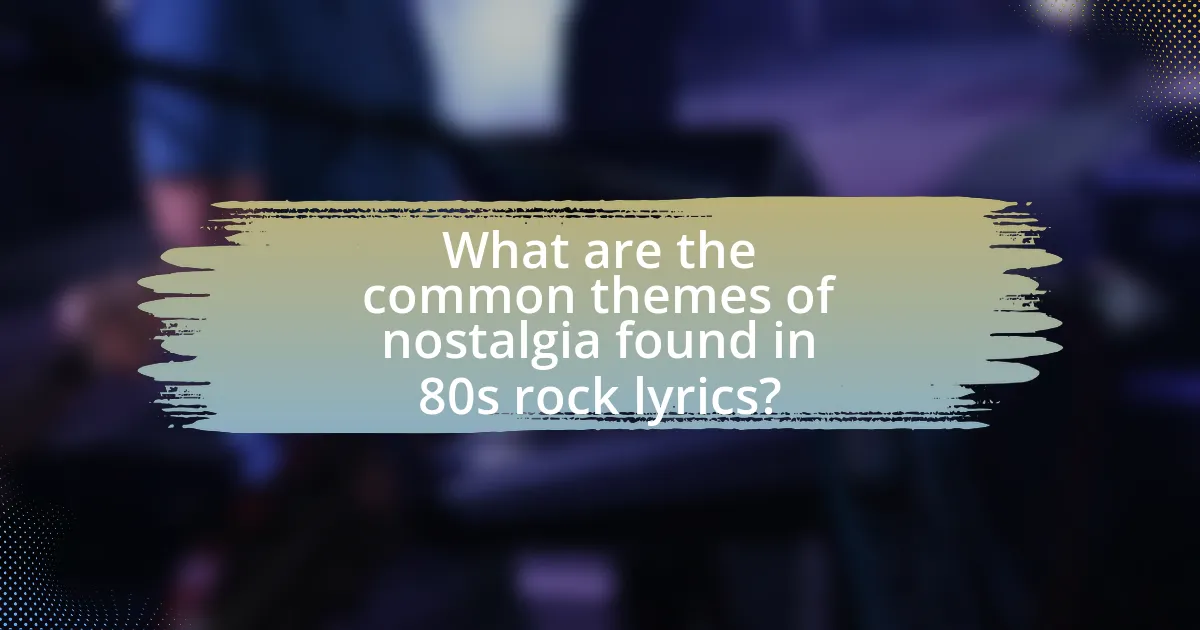
What are the common themes of nostalgia found in 80s rock lyrics?
Common themes of nostalgia in 80s rock lyrics include longing for simpler times, romanticized memories of youth, and reflections on lost love. These themes often evoke a sense of yearning for the past, as seen in songs like “Summer of ’69” by Bryan Adams, which reminisces about carefree days and youthful experiences. Additionally, tracks such as “Time After Time” by Cyndi Lauper highlight the emotional connections and enduring bonds from earlier relationships, reinforcing the idea of nostalgia as a powerful emotional force. The prevalence of these themes in 80s rock reflects a cultural desire to escape the complexities of modern life and reconnect with cherished memories.
How do 80s rock lyrics reflect a longing for the past?
80s rock lyrics reflect a longing for the past by frequently invoking themes of nostalgia, lost love, and simpler times. Many songs from this era, such as “Summer of ’69” by Bryan Adams, explicitly reference past experiences and memories, creating a sense of yearning for earlier days. This longing is often expressed through vivid imagery and emotional storytelling, allowing listeners to connect with their own memories. The cultural context of the 1980s, marked by significant social changes and a desire to escape the complexities of modern life, further amplified this nostalgic sentiment in rock music.
What are some examples of songs that illustrate this longing?
Examples of songs that illustrate longing in 80s rock include “Time After Time” by Cyndi Lauper, “Every Breath You Take” by The Police, and “I Want to Know What Love Is” by Foreigner. These tracks evoke feelings of nostalgia and yearning through their lyrics and melodies. “Time After Time” expresses a deep emotional connection and the desire for companionship, while “Every Breath You Take” conveys an obsessive longing for a lost love. “I Want to Know What Love Is” articulates a quest for understanding and connection, encapsulating the essence of longing prevalent in 80s rock music.
How do these themes resonate with listeners today?
Themes of nostalgia in 80s rock lyrics resonate with listeners today by evoking a sense of longing for simpler times and shared cultural experiences. This emotional connection is particularly strong among individuals who grew up during that era, as studies show that nostalgia can enhance mood and foster social connectedness. For instance, a 2020 study published in the journal “Emotion” found that nostalgic music can trigger positive memories and feelings, reinforcing the idea that 80s rock lyrics serve as a powerful reminder of personal and collective histories.
What role do specific cultural references play in 80s rock nostalgia?
Specific cultural references in 80s rock nostalgia serve to evoke memories and emotions associated with that era, enhancing the listener’s connection to the music. These references often include iconic events, fashion trends, and popular media from the 1980s, which resonate with audiences who experienced that time. For instance, songs that mention movies like “The Breakfast Club” or cultural phenomena such as MTV tap into shared experiences, reinforcing a sense of belonging and identity among fans. This nostalgia is supported by studies indicating that music tied to personal memories can trigger emotional responses, making the cultural references in 80s rock not just decorative but integral to the nostalgic experience.
Which iconic events or symbols are frequently referenced in these lyrics?
Iconic events and symbols frequently referenced in 80s rock lyrics include the Vietnam War, the American Dream, and cultural phenomena like MTV and the rise of youth counterculture. These references evoke a sense of nostalgia, connecting listeners to significant historical moments and societal changes of the era. For instance, the Vietnam War symbolizes conflict and disillusionment, while the American Dream represents aspirations and the pursuit of happiness. MTV’s emergence as a cultural force transformed music consumption and visual representation, making it a pivotal symbol in 80s rock.
How do these references enhance the nostalgic experience for listeners?
References in 80s rock lyrics enhance the nostalgic experience for listeners by evoking specific memories and cultural touchstones from that era. These references often include iconic events, popular culture, and shared experiences that resonate with the audience, creating a sense of familiarity and emotional connection. For example, mentioning classic cars, fashion trends, or significant historical moments allows listeners to recall their own experiences from the 1980s, reinforcing their emotional ties to the music. This phenomenon is supported by psychological studies indicating that nostalgia can increase feelings of social connectedness and personal identity, making the music more impactful and memorable for the audience.
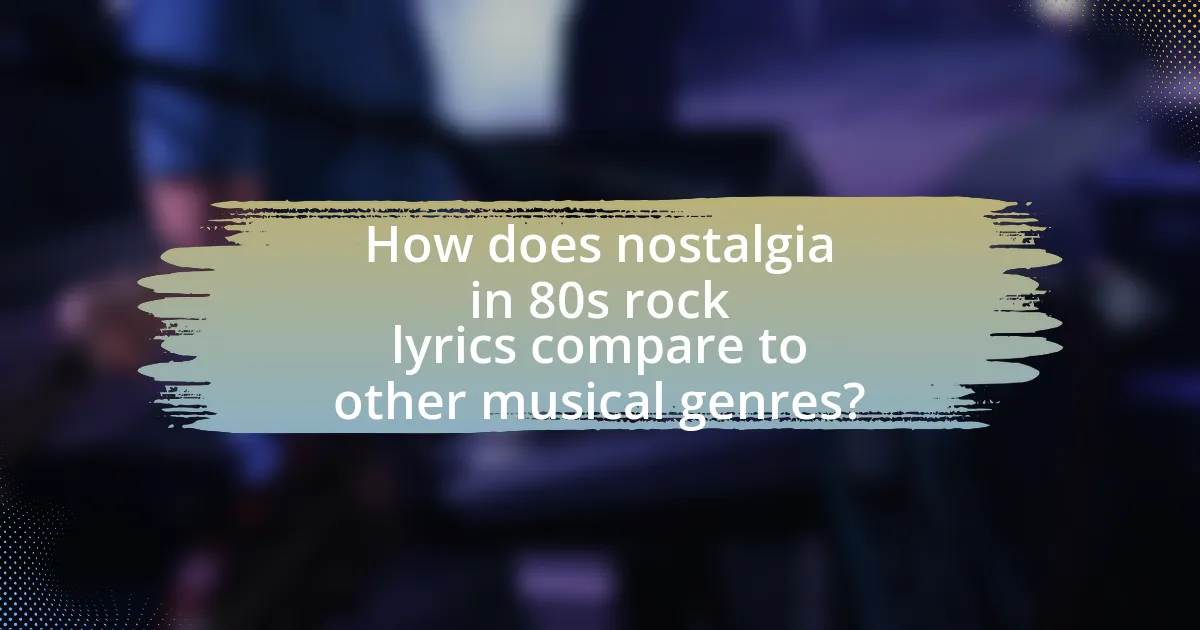
How does nostalgia in 80s rock lyrics compare to other musical genres?
Nostalgia in 80s rock lyrics is characterized by a strong emphasis on personal memories and cultural references, often evoking a sense of longing for simpler times, which contrasts with other musical genres that may focus more on social or political themes. For instance, while 80s rock frequently incorporates imagery of youth, freedom, and past relationships, genres like hip-hop and punk often address contemporary issues such as inequality and rebellion. This distinction is evident in songs like “Summer of ’69” by Bryan Adams, which reminisces about youthful experiences, compared to the politically charged lyrics found in punk rock anthems like “Anarchy in the U.K.” by the Sex Pistols. The prevalence of nostalgia in 80s rock can be attributed to the era’s cultural context, where economic prosperity and the rise of youth culture fostered a collective yearning for the past.
What similarities exist between 80s rock nostalgia and nostalgia in other genres?
80s rock nostalgia shares similarities with nostalgia in other genres through themes of longing for the past, emotional resonance, and cultural references. Both evoke feelings of sentimentality and connection to formative experiences, often utilizing specific imagery and sounds that trigger memories. For instance, 80s rock frequently references youth culture, fashion, and social dynamics, paralleling how nostalgia in pop, hip-hop, or country music similarly taps into personal and collective memories. Studies indicate that nostalgia can enhance emotional well-being, a phenomenon observed across various musical styles, reinforcing the universal appeal of reminiscing about earlier times.
How do different genres approach the theme of nostalgia in their lyrics?
Different genres approach the theme of nostalgia in their lyrics by utilizing distinct stylistic elements and emotional tones. For instance, 80s rock often evokes nostalgia through anthemic melodies and vivid storytelling, reflecting on personal experiences and cultural moments, as seen in songs like “Summer of ’69” by Bryan Adams, which reminisces about youthful freedom and simpler times. In contrast, country music frequently employs storytelling techniques that highlight familial ties and rural life, as exemplified by songs like “Take Me Home, Country Roads” by John Denver, which evokes a longing for home and belonging. Hip-hop, on the other hand, may approach nostalgia by referencing past cultural icons and experiences, as demonstrated in tracks like “Juicy” by The Notorious B.I.G., which reflects on his rise from humble beginnings while reminiscing about his past. Each genre thus encapsulates nostalgia through its unique lens, shaping how listeners connect with memories and emotions tied to their experiences.
What unique aspects of 80s rock make its nostalgic themes stand out?
The unique aspects of 80s rock that make its nostalgic themes stand out include its distinctive sound characterized by synthesizers, anthemic choruses, and a blend of glam and punk influences. This era’s music often evokes feelings of longing and reminiscence through lyrics that reflect personal experiences, cultural shifts, and societal changes. For instance, songs like “Summer of ’69” by Bryan Adams encapsulate youthful nostalgia, while the use of vivid imagery and storytelling in tracks like “We Built This City” by Starship highlights the contrast between past ideals and present realities. The combination of these musical elements and lyrical themes creates a powerful emotional resonance that continues to connect with audiences, reinforcing the lasting impact of 80s rock on collective memory.
How has nostalgia in 80s rock lyrics influenced contemporary music?
Nostalgia in 80s rock lyrics has significantly influenced contemporary music by inspiring themes of longing and reminiscence in songwriting. Many modern artists, such as The Weeknd and Dua Lipa, incorporate 80s-inspired sounds and lyrical motifs that evoke feelings of nostalgia, reflecting a cultural yearning for the past. This influence is evident in the resurgence of synth-pop elements and retro production techniques, which have become prevalent in contemporary hits. For instance, The Weeknd’s “Blinding Lights” features synthesizers reminiscent of 80s music, and its lyrical content taps into themes of lost love and yearning, mirroring the emotional depth found in classic 80s rock songs. This blending of past and present illustrates how nostalgia serves as a powerful tool for artists to connect with audiences through shared emotional experiences.
What modern artists draw inspiration from 80s rock nostalgia?
Modern artists such as The 1975, Haim, and Dua Lipa draw significant inspiration from 80s rock nostalgia. The 1975 incorporates synth-pop elements reminiscent of the 80s in their music, while Haim’s sound features guitar-driven melodies that echo classic rock influences. Dua Lipa’s “Future Nostalgia” album explicitly channels 80s pop and rock aesthetics, blending them with contemporary styles. These artists reflect the enduring impact of 80s rock through their musical styles and thematic choices, showcasing a revival of the era’s iconic sounds and cultural motifs.
How do current trends reflect the nostalgic elements of 80s rock?
Current trends in music reflect the nostalgic elements of 80s rock through the resurgence of synth-driven sounds, vibrant aesthetics, and lyrical themes centered on youthful rebellion and romance. Artists today often incorporate synthesizers and electronic beats reminiscent of the 80s, as seen in the works of bands like The 1975 and Dua Lipa, who utilize retro production techniques to evoke a sense of nostalgia. Additionally, music videos and fashion inspired by 80s styles, such as neon colors and vintage clothing, further reinforce this connection. The popularity of playlists featuring classic 80s rock hits on streaming platforms indicates a cultural longing for that era, demonstrating how contemporary music is both influenced by and pays homage to the iconic sounds and styles of 80s rock.
What practical insights can we gain from analyzing nostalgia in 80s rock lyrics?
Analyzing nostalgia in 80s rock lyrics reveals practical insights into cultural identity and emotional connection. The lyrics often reflect a longing for simpler times, which resonates with listeners who experienced that era, fostering a sense of community and shared experience. For instance, songs like “Summer of ’69” by Bryan Adams evoke memories of youth and freedom, illustrating how nostalgia can enhance emotional engagement with music. This emotional connection can be leveraged in marketing strategies, as brands often use nostalgic elements to evoke positive feelings and drive consumer behavior. Additionally, understanding the themes of nostalgia in these lyrics can inform psychological studies on memory and identity, highlighting how music shapes personal and collective narratives.
How can songwriters effectively incorporate nostalgia into their lyrics?
Songwriters can effectively incorporate nostalgia into their lyrics by using specific imagery, references to past cultural moments, and emotional storytelling that resonates with shared experiences. For instance, referencing iconic symbols from the 1980s, such as cassette tapes or classic cars, evokes a sense of time and place that listeners can relate to. Additionally, employing themes of lost love or simpler times taps into universal feelings of longing and reminiscence, which are central to nostalgic experiences. Research indicates that nostalgia can enhance emotional connection in music, as demonstrated in studies like “Nostalgia: A Psychological Resource” by Wildschut et al., which shows that nostalgic memories can foster feelings of social connectedness and improve mood. Thus, by weaving these elements into their lyrics, songwriters can create a powerful nostalgic effect that resonates deeply with their audience.
What lessons can be learned about audience connection through nostalgia in music?
Nostalgia in music fosters a deep emotional connection with audiences by evoking shared memories and experiences. This connection is particularly evident in 80s rock lyrics, which often reference cultural touchstones that resonate with listeners’ formative years. For example, songs like “Summer of ’69” by Bryan Adams tap into the universal themes of youth and nostalgia, creating a sense of belonging and familiarity. Research indicates that nostalgia can enhance emotional responses, making listeners more receptive to the music and its messages. This emotional engagement is crucial for artists aiming to build lasting relationships with their audience, as it reinforces loyalty and encourages repeated listening.
